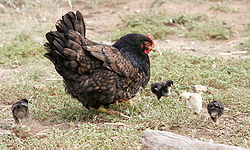ܬܪܢܓܘܠܬܐ
Hello, you have come here looking for the meaning of the word ܬܪܢܓܘܠܬܐ. In DICTIOUS you will not only get to know all the dictionary meanings for the word ܬܪܢܓܘܠܬܐ, but we will also tell you about its etymology, its characteristics and you will know how to say ܬܪܢܓܘܠܬܐ in singular and plural. Everything you need to know about the word ܬܪܢܓܘܠܬܐ you have here. The definition of the word ܬܪܢܓܘܠܬܐ will help you to be more precise and correct when speaking or writing your texts. Knowing the definition ofܬܪܢܓܘܠܬܐ, as well as those of other words, enriches your vocabulary and provides you with more and better linguistic resources.

ܬܪܢܓܠܐ
Assyrian Neo-Aramaic

Etymology
Inherited from Aramaic תַּרְנָגוּלְתָּא (tarənāḡūtlā), from Akkadian; compare Hebrew תַּרְנְגֹלֶת (tarnególet).
Pronunciation
Noun
ܬܲܪܢܵܓ݂ܘܼܠܬܵܐ • (tarnāḡultā) f sg (plural ܬܲܪ̈ܢܵܓ݂ܠܵܬ݂ܵܐ (tarnāḡlāṯā) or ܬܲܪ̈ܢܵܓ݂ܘܼܠܝܵܬ݂ܵܐ (tarnāḡulyāṯā), masculine ܬܲܪܢܵܓ݂ܠܵܐ (tarnāḡlā))
Inflection
| isolated forms | with possessive pronouns | |||||||
|---|---|---|---|---|---|---|---|---|
| state | form | person | singular | plural | ||||
| m | f | |||||||
| singular | absolute | ܬܲܪܢܵܓ݂ܠܵܐ (tarnāḡlā) | 1st person | ܬܲܪܢܵܓ݂ܘܼܠܬܝܼ (tarnāḡultī) | ܬܲܪܢܵܓ݂ܘܼܠܬܲܢ (tarnāḡultan) | |||
| construct | ܬܲܪܢܵܓ݂ܠܲܬ݂ (tarnāḡlaṯ) | 2nd person | ܬܲܪܢܵܓ݂ܘܼܠܬܘܼܟ݂ (tarnāḡultōḵ) | ܬܲܪܢܵܓ݂ܘܼܠܬܵܟ݂ܝ (tarnāḡultāḵ) | ܬܲܪܢܵܓ݂ܘܼܠܬܲܘܟ݂ܘܿܢ (tarnāḡultawḵōn) | |||
| emphatic | ܬܲܪܢܵܓ݂ܘܼܠܬܵܐ (tarnāḡultā) | 3rd person | ܬܲܪܢܵܓ݂ܘܼܠܬܹܗ (tarnāḡultēh) | ܬܲܪܢܵܓ݂ܘܼܠܬܵܗ̇ (tarnāḡultāh) | ܬܲܪܢܵܓ݂ܘܼܠܬܗܘܿܢ (tarnāḡulthōn) | |||
| plural | absolute | ܬܲܪ̈ܢܵܓ݂ܠܵܢ (tarnāḡlān) | 1st person | ܬܲܪ̈ܢܵܓ݂ܠܵܬ݂ܝܼ (tarnāḡlāṯī) | ܬܲܪ̈ܢܵܓ݂ܠܵܬ݂ܲܢ (tarnāḡlāṯan) | |||
| construct | ܬܲܪ̈ܢܵܓ݂ܠܵܬ݂ (tarnāḡlāṯ) | 2nd person | ܬܲܪ̈ܢܵܓ݂ܠܵܬ݂ܘܼܟ݂ (tarnāḡlāṯōḵ) | ܬܲܪ̈ܢܵܓ݂ܠܵܬ݂ܵܟ݂ܝ (tarnāḡlāṯāḵ) | ܬܲܪ̈ܢܵܓ݂ܠܵܬ݂ܲܘܟ݂ܘܿܢ (tarnāḡlāṯawḵōn) | |||
| emphatic | ܬܲܪ̈ܢܵܓ݂ܠܵܬ݂ܵܐ (tarnāḡlāṯā) | 3rd person | ܬܲܪ̈ܢܵܓ݂ܠܵܬ݂ܹܗ (tarnāḡlāṯēh) | ܬܲܪ̈ܢܵܓ݂ܠܵܬ݂ܵܗ̇ (tarnāḡlāṯāh) | ܬܲܪ̈ܢܵܓ݂ܠܵܬ݂ܗܘܿܢ (tarnāḡlāṯhōn) | |||
Derived terms
- ܩܠܘܼܒ݂ܝܵܐ ܕܬܲܪ̈ܢܵܓ݂ܠܵܬ݂ܵܐ (qluḇyā dtarnāḡlāṯā, “chicken coop”)
- ܬܲܪܢܵܓ݂ܠܲܬ݂ ܒܲܪܵܐ (tarnāḡlaṯ barrā, “hoopoe”)
See also
Classical Syriac
Alternative forms
Etymology
From Akkadian 𒁯𒈗𒄷 (DAR.LUGALMUŠEN /tarnugallu, tarlugallu/), from Sumerian 𒁯𒈗𒄷 (/dar-lugal/, literally “great, kingly, or crowned francolin; another member of the Gallini”). Compare Hebrew תַּרְנְגֹלֶת (tarnəḡṓleṯ).
Pronunciation
Noun
ܬܪܢܓܘܠܬܐ • (tarnāḡultā) f (plural ܬܪܢܓܘܠܝܬܐ or ܬܪܢܓܘܠܬܐ, singular masculine counterpart ܬܪܢܓܠܐ)
Inflection
| isolated forms | with possessive pronouns | |||||||
|---|---|---|---|---|---|---|---|---|
| state | form | person | singular | plural | ||||
| m | f | m | f | |||||
| singular | absolute | ܬܪܢܓܘܠܐ | 1st person | ܬܪܢܓܘܠܬܝ | ܬܪܢܓܘܠܬܢ | |||
| construct | ܬܪܢܓܘܠܬ | 2nd person | ܬܪܢܓܘܠܬܟ | ܬܪܢܓܘܠܬܟܝ | ܬܪܢܓܘܠܬܟܘܢ | ܬܪܢܓܘܠܬܟܝܢ | ||
| emphatic | ܬܪܢܓܘܠܬܐ | 3rd person | ܬܪܢܓܘܠܬܗ | ܬܪܢܓܘܠܬܗ | ܬܪܢܓܘܠܬܗܘܢ | ܬܪܢܓܘܠܬܗܝܢ | ||
| plural | absolute | ܬܪܢܓܘܠܝܢ ,ܬܪܢܓܘܠܢ | 1st person | ܬܪܢܓܘܠܝܬܝ ,ܬܪܢܓܘܠܬܝ | ܬܪܢܓܘܠܝܬܢ ,ܬܪܢܓܘܠܬܢ | |||
| construct | ܬܪܢܓܘܠܝܬ ,ܬܪܢܓܘܠܬ | 2nd person | ܬܪܢܓܘܠܝܬܟ ,ܬܪܢܓܘܠܬܟ | ܬܪܢܓܘܠܝܬܟܝ ,ܬܪܢܓܘܠܬܟܝ | ܬܪܢܓܘܠܝܬܟܘܢ ,ܬܪܢܓܘܠܬܟܘܢ | ܬܪܢܓܘܠܝܬܟܝܢ ,ܬܪܢܓܘܠܬܟܝܢ | ||
| emphatic | ܬܪܢܓܘܠܝܬܐ ,ܬܪܢܓܘܠܬܐ | 3rd person | ܬܪܢܓܘܠܝܬܗ ,ܬܪܢܓܘܠܬܗ | ܬܪܢܓܘܠܝܬܗ ,ܬܪܢܓܘܠܬܗ | ܬܪܢܓܘܠܝܬܗܘܢ ,ܬܪܢܓܘܠܬܗܘܢ | ܬܪܢܓܘܠܝܬܗܝܢ ,ܬܪܢܓܘܠܬܗܝܢ | ||
References
- “trnwglh”, in The Comprehensive Aramaic Lexicon Project, Cincinnati: Hebrew Union College, 1986–, retrieved 8 August 2012
- Costaz, Louis (2002) Dictionnaire syriaque-français ∙ Syriac–English Dictionary ∙ قاموس سرياني-عربي, 3rd edition, Beirut: Dar El-Machreq, page 397b
- Payne Smith, Jessie (1903) A Compendious Syriac Dictionary Founded Upon the Thesaurus Syriacus of R. Payne Smith, D.D., Oxford: Clarendon Press, page 621a
- Sokoloff, Michael (2009) A Syriac Lexicon: A Translation from the Latin, Correction, Expansion, and Update of C. Brockelmann's Lexicon Syriacum, Winona Lake, Indiana, Piscataway, New Jersey: Eisenbrauns; Gorgias Press, →ISBN, page 1669a